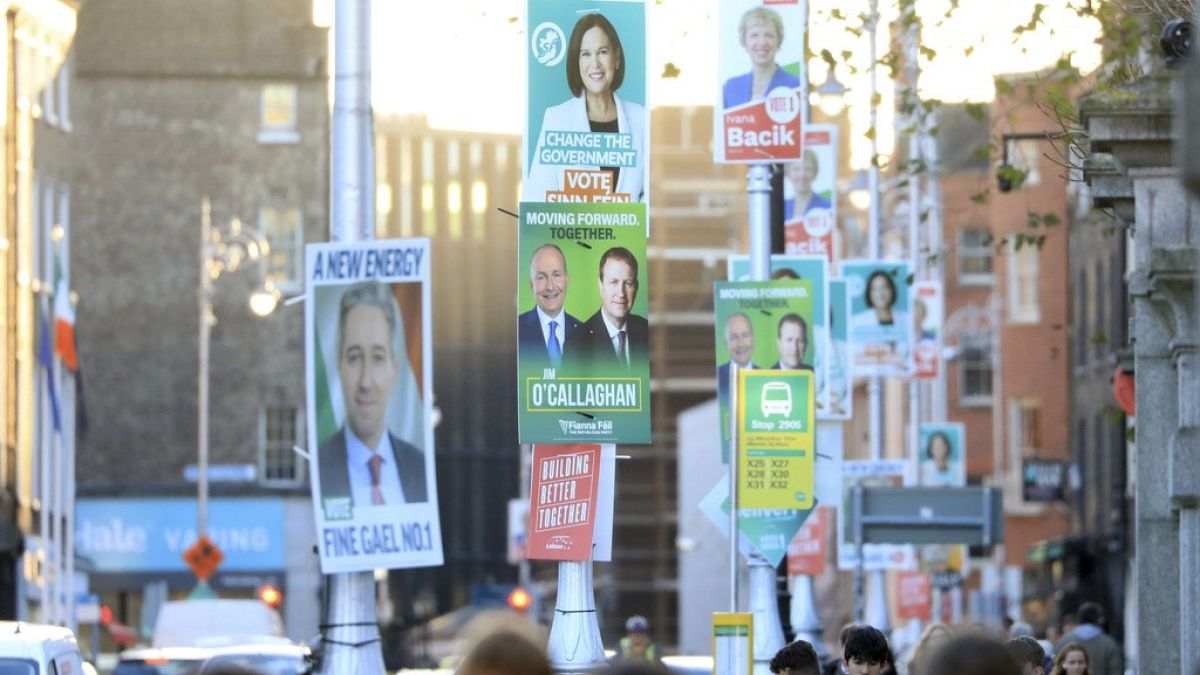Unlike many of its European peers, Ireland’s coffers are filled to the brim. Economists warn that the state must save – but winning elections doesn’t come cheap.
When Ireland’s political leaders locked horns in a TV debate earlier this week, economic pledges emerged front and centre.
Today, the country will vote in a general election, called early by incumbent Taoiseach Simon Harris.
The centre-right Fine Gael leader will be running against Michéal Martin of Fianna Fáil, as well as Mary Lou McDonald of Sinn Féin, for the top job.
Unlike its European neighbours, Ireland is going to the polls in a strong financial position. Unemployment is low, state coffers are full, and inflation is falling.
Reports of economic success, however, don’t reflect reality for many.
Prices remain high, despite falling inflation. Ireland is also dealing with deep structural issues, meaning necessities like housing and healthcare are increasingly unaffordable.
A multinational magnet
Ireland’s wealth in the face of a wider regional downturn is largely thanks to its decades-longlove affair with multinationals.
The country’s corporate tax rate – which has now been raised – remained for years at a meagre 12.5%.
The result of this policy was that Ireland became a magnet for big corporations, who set up camp along Dublin’s river Liffey.
In 2015, corporation tax receipts amounted to €7bn in the country. This year, these are estimated between €23 and €24bn.
More recently, Ireland was given an early – if not slightly embarrassing – Christmas present from the European court of justice (ECJ).
The region’s top court ruled that the country had given Apple illegal tax advantages, forcing the firm to pay Ireland €13bn in unpaid levies.
Saving for a rainy day
A sticking point for Ireland’s politicians is that despite running a budget surplus, economists are advising fiscal caution.
The main reason for this is that the tax revenue is “windfall” – meaning it’s unreliable and mostly based on payments from a few major firms.
“Ireland’s underlying fiscal position is in deficit and deteriorating if the excess corporation taxes are excluded,” said Ricardo Amaro, lead economist at Oxford Economics.
Speaking to Euronews in September, he noted that the government’s breaches of its own spending rule undermine the credibility of this fiscal safeguard.
Introduced in 2021, the rule limits spending growth to 5% per year – unless the expenditure is financed through higher taxes.
A second argument for fiscal caution is the potential inflationary effect of a big budget.
By offering tax cuts and giveaways, this could increase consumer demand for goods and services – which may then push up prices.
Ireland’s high employment levels are also significant as citizens with jobs are more likely to spend, suggesting extra government stimulus isn’t needed.
It’s equally important to note that the shortage of unemployed people to fill jobs can push up wages if companies are competing for talent.
The October budget
According to the Irish Fiscal Advisory Council (IFAC), the state’s recent budget failed the frugality test.
Financial plans for 2025, announced by Ireland’s coalition government in October, amount to €9.1 billion.
The generous budget “repeats Ireland’s past mistakes of pumping billions into the economy when it is at full employment,” said the IFAC.
Hanging over economists’ shoulders is the shadow of the Celtic Tiger, Ireland’s growth era of the nineties and noughties, as well as the subsequent crash.
The country managed to revolutionise its GDP growth during the space of about a decade, largely down to foreign direct investment.
In 2008, when the global financial crisis came along, the Tiger nonetheless received a death blow.
Foreign money dried up, trade slowed, and Ireland’s overstimulated housing market came crashing down.
Banks that had made risky loans found themselves in hot water, requiring state aid to avoid collapse.
Are we heeding history?
The bailout program is “not something of the past”, said Simon Harris in the leaders’ debate on Tuesday, a message echoed by Martin and McDonald.
“There are people sitting at home tonight… still living with the scars of the financial crash. Now we have to learn from that as a country,” argued Harris.
Sinn Féin was notably accused by the two centrist leaders of fiscal recklessness.
McDonald disagreed, instead highlighting Martin’s presence in government during the Tiger years.
“I’ve learned from the experience,” said Martin.
The coalition currently in power, which includes Harris and Martin, has funnelled a certain amount of state revenue into sovereign wealth funds.
The IFAC has noted, however, that this amounts to less than half of excess corporation tax receipts.
“Each of the three major parties – Fine Gael, Fianna Fáil and Sinn Féin, are banking on the glut of corporation tax receipts from a handful of US multinationals continuing indefinitely,” Barra Roantree, assistant professor of economics at Trinity College Dublin, told Euronews.
Roantree added that the re-election of Trump increases the risk for the Irish economy, meaning politicians should be preparing for reduced revenue.
If the US introduces tax breaks for major corporations, this could tempt firms away from Ireland. Another risk is Trump’s proposed raft of tariffs – which could hit Irish exports.
Spending can win votes
Despite calls for thriftiness, politicians are under pressure to deliver giveaways said Professor John McHale, head of economics at Galway University.
He told Euronews that “significant needs in areas such as housing and infrastructure”, as well as cost of living pressures, have made frugality politically complicated.
When asked about the spending manifestos of Ireland’s three major parties, he noted that they are all “proposing a significant rundown in the projected cumulative surplus”.
Sinn Féin, however, has outlined “the most ambitious spending plans and the largest reduction in the surplus by some margin”, he added.
While talk of spending is making economists wince, it’s clear that infrastructure investments must be prioritised over short-term giveaways.
Who the Irish people trust to do that still hangs in the balance.
At the time of writing, polls show Fianna Fáil narrowly ahead of Fine Gael, trailed by Sinn Féin.

